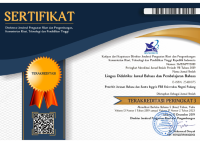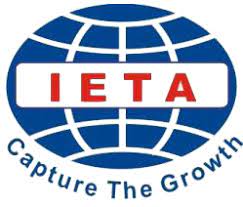Implementation of project-based learning in English Classroom of Merdeka Curriculum: Student and Teacher Perception
 ), Sonya Puspasari Suganda(2),
), Sonya Puspasari Suganda(2), (1) Universitas Indonesia
(2) Universitas Indonesia
 Corresponding Author
Corresponding Author
Copyright (c) 2023 Lingua Didaktika: Jurnal Bahasa dan Pembelajaran Bahasa
DOI : https://doi.org/10.24036/ld.v17i2.126166
Full Text:
 Language : en
Language : en
Abstract
This research aims to investigate the implementation of project-based learning in English classrooms on two schools selected as “Sekolah Penggerak” who hold Merdeka Curriculum as primary curriculum supervised by government; one is a private school, meanwhile the other one is a public school. Both are the first and pioneer schools who chose to implement the curriculum. Project-based learning is a fundamental approach which underlie the basis of the curriculum; thus, projects are being heavily imposed. This research puts emphasis on project-based learning implementation inside English classroom under newest curriculum in terms of students and teachers’ perception. Mixed-method case study is used; as the instruments such as online questionnaire and interviews are heavily used. The data were collected from 142 participants (140 students and 2 teachers) then were analyzed quantitatively and qualitatively. Findings stated that project-based learning is used based on its own context and characteristics of schools. Students possessed positive views on both the implementation and their teachers implementing project-based learning in English classroom of Merdeka Curriculum. Students are motivated, active and possess critical thinking on their projects. Teachers, in the other side, actively and eagerly to get involved as facilitator to facilitate steps on project-based learning implementation. This research contributes on giving samples and development of project-based learning in English Classroom under newest Merdeka Curriculum.
Keywords
References
Choi, J., Lee, J. H., & Kim, B. (2019). How does learner-centered education affect teacher self-efficacy? The case of project-based learning in Korea. Teaching and Teacher Education, 85, 45-57.
Creswell, J. W., & Creswell, J. D. (2017). Research design: Qualitative, quantitative, and mixed methods approaches. Sage publications.
Fernandes, S. R. G. (2014). Preparing graduates for professional practice: findings from a case study of Project-based Learning (PBL). Procedia-Social and Behavioral Sciences, 139, 219-226.
Gómez-Pablos, V. B., del Pozo, M. M., & Muñoz-Repiso, A. G. V. (2017). Project-based learning (PBL) through the incorporation of digital technologies: An evaluation based on the experience of serving teachers. Computers in human behavior, 68, 501-512.
Hidayati, D., Novianti, H., Khansa, M., Slamet, J., & Suryati, N. (2023). Effectiveness Project-Based Learning in ESP Class: Viewed from Indonesian Students ‘Learning Outcomes. International Journal of Information and Education Technology, 13(3), 558-565.
Kemendikbud. (2021). Diakses pada 28 April 2023, 17:48, dari
https://ditsmp.kemdikbud.go.id/pentingnya-proyek-penguatan-profil-pelajar-pancasila-di-satuan-pendidikan/
Kwietniewski, K. (2017). Literature review of project based learning.
Kokotsaki, D.; Menzies, V.; Wiggins, A. (2016). Project-based learning: A review of the literature. Improving Schools, 19(3), 1365480216659733. doi:10.1177/1365480216659733
Li, D., Zhang, C., & He, Y. (2015). Project-based learning in teaching translation- students’ perceptions. The Interpreter and Translator Trainer, 9(1), 1–19. doi-10.1080/1750399x.2015
Milan Maros, Marcela Korenkova, Milan Fila, Michal Levicky & Maria Schoberova.
(2023). Project-based learning and its effectiveness: evidence from Slovakia, Interactive Learning Environments, 31:7, 4147- 4155.
doi: 10.1080/10494820.2021.1954036
Onwuegbuzie, A. J., Slate, J. R., Leech, N. L., & Collins, K. M. (2007). Conducting mixed analyses: A general typology. International Journal of Multiple Research Approaches, 1(1), 4-17.
Petersen, C., & Nassaji, H. (2016). Project-based learning through the eyes of teachers and students in adult ESL classrooms. Canadian Modern Language Review, 72(1), 13-39.
Puslapdik.kemdikbud.go.id, (2021). Diakses pada 28 April 2023, 19.08 dari https://puslapdik.kemdikbud.go.id/project-based-learning-profil-pelajar-pancasila-dan-gen-z/
Sartika, U. D., Syafryadin, S., & Azwandi, A. (2022). English Teachers' Perception of Implementing Project-Based Learning in Secondary Schools. ENGLISH FRANCA: Academic Journal of English Language and Education, 6(2), 467-485.
Sekolah.penggerak.kemdikbud.go.id, (2021). Diakses pada 28 January 2023, 14.16
dari https://sekolah.penggerak.kemdikbud.go.id/wp-
content/uploads/2021/02/Paparan-Program-Sekolah-Penggerak.pdf
Thomas, M. (2017). Project-based language learning with technology: Learner
collaboration in an EFL classroom in Japan (Vol. 1). Taylor & Francis.
 Article Metrics
Article Metrics
 Abstract Views : 338 times
Abstract Views : 338 times
 PDF Downloaded : 113 times
PDF Downloaded : 113 times
Refbacks
- There are currently no refbacks.
Copyright (c) 2023 Lingua Didaktika: Jurnal Bahasa dan Pembelajaran Bahasa

This work is licensed under a Creative Commons Attribution-NonCommercial 4.0 International License.









